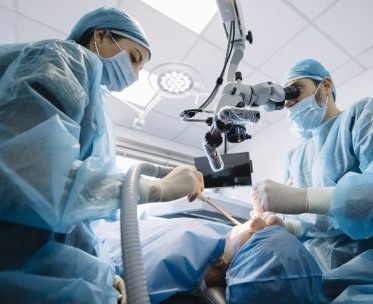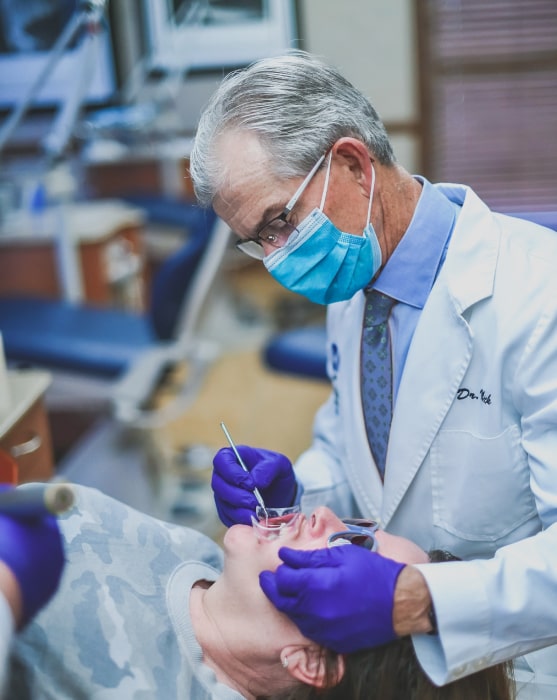SERVICES
Orthognathic Surgery & Surgical Orthodontics
Orthognathic surgery is a surgery to correct the upper and lower jaw when they are not aligned properly to improve the way it works. When orthodontics alone will not be able to fully correct a bad bite, the addition of orthognathic surgery will help create a beautiful, lasting smile. This surgery also helps to improve facial appearance.
BRACES
Surgical orthodontics is the combination of both orthodontic treatment and orthognathic (jaw) surgery
Surgical orthodontics is used to correct severe cases that include bad bites, jaw bone abnormalities, severe malocclusion, and sleep disorders. In some cases, it is caused by genetics. As people grow, their upper and low jaws grow out of proportion which makes upper and lower teeth meet causing the problem in biting, chewing, or speaking. The surgery also includes your bad bite reconstruction i.e. underbite surgery and overbite surgery. Oral and Maxillofacial Surgery is one of the nine recognized dental specialties, and it focuses on treating complex craniofacial cases that involved the mouth, jaws, face, and skull. If you require surgical orthodontics, you can meet our doctors at the oral and maxillofacial surgery department who are leaders in clinical innovation and scientific research. We ensure that you receive the best possible care, including customized solutions for Orthodontics and Braces for Adults.


When might surgical orthodontics be necessary?
The need for surgical orthodontics occurs when the jaws do not line up correctly, and a proper bite cannot be achieved with orthodontic treatment alone. Surgical orthodontics may be used to treat adults with improper bites or other aesthetic concerns. Typically, jaw bone stops growing by age 16 in females and 18 in males. In order to receive orthognathic surgery, the jaw must be growing.
Orthodontic treatment is used to align the teeth before orthognathic surgery, which will properly align the jaws.
How does orthognathic surgery work?
An oral and maxillofacial surgeon will perform your orthognathic surgery, and the surgery will take place in a hospital. Jaw reconstruction surgery can take several hours depending on each individual case. Once the surgery is complete, you will have about a two-week rest period. Since orthognathic surgery is a major treatment, we recommend that you schedule some time away from work and school during the healing process. After your jaw has healed, your orthodontist will begin to “fine-tune” your bite. After surgery, you will have to wear braces, and most braces are removed within six to 12 months following surgery. After your braces are removed, you will wear a retainer to help maintain your new smile.
How do you prepare for Orthognathic Surgery?
If you are thinking about correcting your jaws then first you need to see an orthodontist. Everyone has different jaw shapes and sizes. After you visit your orthodontist they will help you develop a treatment plan. In several cases, before surgery, an orthodontist places braces on your teeth which will align your teeth to prepare for treatment. It usually takes about 12 to 18 months. To decrease the time in braces, doctors will use techniques like Three-dimensional CT scanning and temporary orthodontic anchoring devices. It will help in to guide the movement of teeth. There are also cases where these efforts eliminate the need for Orthognathic Surgery.
What are the risks associated with jaw reconstruction surgery?
As with any major medical surgery, there may be certain risks of having jawline surgery (orthognathic surgery). However, the process of orthognathic surgery is not new, and it has been performed for many years. If you’re concerned about an upcoming treatment with orthognathic surgery, please contact our practice and let us know. We are happy to answer any questions that you may have, and provide you with any additional information.
What are the rewards of having corrective jaw surgery?
For many patients, the most important reward of having orthognathic surgery is achieving a beautiful, healthy smile that lasts a lifetime. Whether you need orthodontic treatment to correct a bad bite, malocclusion, or jaw abnormality, orthognathic surgery can help restore your confidence and leave you smiling with confidence for many years to come.
FAQs
Is orthognathic surgery major surgery?
Orthognathic surgery is major surgery and it will take several weeks before a person can return to work or school. You can walk and do light exercises, however, you can’t eat a proper diet.
Is orthognathic surgery worth it?
Orthognathic surgery is a time-consuming process. However, once it is done then you can have many benefits. It improves chewing and biting easier. It also improves the facial structure and the breakdown of teeth.
What is the best age for jaw surgery?
Once when the jaw stops growing, it is the best age for jaw surgery. Usually, it is the end of the teenage years. For boys 17- to 21 years is best and 14-16 for girls.
TRANSFORM YOUR SMILE
Schedule a Visit
To set up a visit with our orthodontists at Mellion Orthodontics, complete and submit this form. Our scheduling coordinator will then contact you to confirm your consultation.
Please note this form is for requesting an appointment. If you need to cancel or reschedule an existing appointment, or if you require immediate attention, please contact our practice directly by calling us.